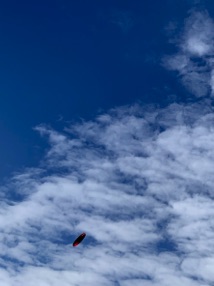The Science of Consciousness:
Chapter 17: Parapsychology
What this chapter is about: What is the evidence for parapsychological phenomena?
Paranormal phenoma are those for which there is no as yet physical explanation, and most scientists, particularly psychologists, would say that they don't exist. They include telepathy, clairvoyance, precognition, psychokinesis (together taken to be psi) and more fringe phenomena, such as ghosts.
Does anything of us survive after death?
I have given many talks on consciousness and parapsychology, and have been surprised how widely accepted paranormal phenomena are. A belief in the soul, ESP, and survival are maybe more common than not. Yet mostly scientists reject all of them, and psychologists are the most vehement in denouncing them. What accounts for this discrepancy?
My opinion on parapsychology: I'm sceptical, but remaining open-minded. I don't see any strong, robust, and replicable scientific evidence for psi. I also don't see a way they can be incorporated into our current scientific framework. But then I'm not wholly sure consciousness, particularly phenomenal experience, can either. And there are several physical and mathematical accounts of consciousness and psi that I don't understand and yet might ultimately be right.
If I had had much more space I would have made this chapter considerably longer. In the end though there are in my view two reasons for keeping it short: (1) most psychologists think there is no robust evidence for any paranormal phenomena, and (2) even if there were, what could it tell us about consciousness?
Survival and near-death experiences
This material now has its own page.
Clarification
p. 389. "How spontaneous phenomena change with time. "At the turn of the century, spirts and afterlife ...": the phrase "At the turn of the century" is ambiguous - I'm referring to the turn of 19-20 th centuries.
Belief in paranormal phenomena
On p. 398 I say "virtually all psychologists think there is no evidence for psi". I think now this might be a bit of an overstatement. Personally I don't know any psychologists who admit to believing there is evidence, and I don't think my sample is too unrepresentative. I'd be interested in hearing about data on this. I have come across some claims that say that 34% of psychologists "believe that extrasensory perception is an established fact or a "likely possibility"; while not disputing this figure, it doesn't gel with my personal experience of psychologists, at least British academic cognitive psychologists.
See this book review by Daryl Bem.
One of the origianl references is:
Wagner, M.W., & Monnet, M. (1979). Attitudes of college professors toward extra-sensory perception. Zetetic Scholar, 5, 7–17.
In any future edition I would have a section on the prevalence of belief in paranormal phenomena in general. In the USA,
"a recent national poll found that over 71% of Americans believe in “miracles”, 42% of Americans believe that “ghosts” exist, 41% think that “extrasensory perception” (e.g., telepathy) is possible and 29% believe in astrology". (Scientific American, reference below).
See these sources:
https://www.scientificamerican.com/article/how-come-some-people-believe-in-the-paranormal/
Mogi, K. (2014). Free will and paranormal beliefs. Frontiers in Psychology, 5. https://doi.org/10.3389/fpsyg.2014.00281 This paper related belef in the paranormal to belief in free will.
Wiseman, R., & Watt, C. (2006). Belief in psychic ability and the misattribution hypothesis: A qualitative review. British Journal of Psychology, 97, 323–338. https://doi.org/10.1348/000712605X72523
The ganzfeld. See this 2023 book by Andrew Endersby, Staring at a Red Sky.
Recent papers on parapsychology in "mainstream" journals
Ng, Y.-K. (2021). Could artificial intelligence have consciousness? Some perspectives from neurology and parapsychology. AI & Society. https://doi.org/10.1007/s00146-021-01305-x.
Rabeyron, T. (2020). Why most research findings about psi are false: The replicability crisis, the Psi paradox and the Myth of Sisyphus. Frontiers in Psychology, 11, 562992. https://doi.org/10.3389/fpsyg.2020.562992
UFOs
I am occasionally asked "why is there nothing about UFOs or ufology in your parapsychology chapter? My view is that there are either UFOs visitng earth, or there aren't (and I think there probably aren't). It's a non-consciousness matter for science. Why people misidentify some things (e.g. weather balloons) is a matter for psychology, and researchers on visual perception, but again isn't directly related to consciousness research.
Reports of alien abduction are another matter, but are probably covered in the chapter on ASCs. I will probably include a section on this in any new editon.

